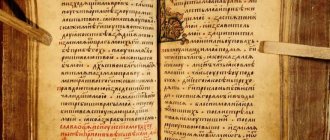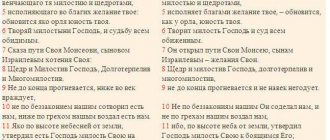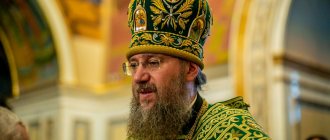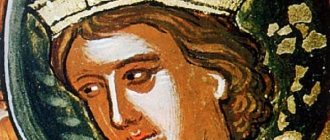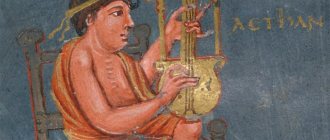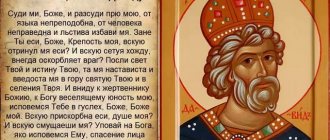Psalm instead of prayer
Reverend Arseny of Cappadocia (1840 - 1924), a Greek who lived in Turkey, compiled an explanation of the Psalter. He indicated in what everyday situations one or another psalm could be read. This was mainly due to the lack of special prayers in Orthodoxy for various needs and needs. For example, Psalm 22 is recommended to be read to pacify disobedient children. In Orthodox church practice, it is customary to read all psalms in Church Slavonic. However, for most modern people the meaning of prayers remains unclear. Natural questions arise. Is it possible to read Psalm 23 in Russian? Why read Psalm 23 at all? Is there an accessible and intelligible interpretation of the psalm?
Opened Psalter
When to read the prayer “The Lord is my shepherd”
The psalm tells about the salvation of the soul, but only those who have accepted the Lord as their Shepherd and unconditionally trusted him can read it.
- The prayer “The Lord is my shepherd” helps to express gratitude to the Lord and feel the grace of direct communication with God.
- The text of the prayer is read to preserve life in difficult times, when a person feels that he is walking through the “valley of the shadow of death.”
- The Monk Arseny of Cappadocia advised turning to Psalm 22 in order to pacify disobedient children who upset their parents.
- The words of prayer are filled with healing power. They help to calm anger, reconcile those at war, comfort the grieving, instill faith in the desperate, relieve the weak from pain, and impart spiritual strength to the suffering.
- Psalm 22 is usually read before holy communion, the Eucharist, which signify our participation in God, unity with him. It is written into the rules of preparation for these sacraments.
- This prayer helps to undergo sincere heartfelt repentance.
Psalm 22 contains great wisdom. If you read it daily, then a moment of completeness and clarity will come in your life, it will be illuminated with light and there will be no place in it for fears, evil and ignorance.
What is the Psalter and Psalms
A widely known book of the Old Testament is the Psalter. It consists of separate chants - psalms. The author of most of the psalms is the king and prophet David (1035-965 BC). The features of these hymns dedicated to God are the personal experiences of the psalmist. He is like a child, striving to share his joy, anxiety, fears with his Father, asking for forgiveness, help and intercession.
“The Book of Psalms... is a common treasury of good teachings and carefully seeks out what is beneficial to everyone. She also heals old wounds of the soul, and gives quick healing to the recently wounded. He restores what is painful and supports what is not damaged. In general, as much as possible, he destroys the passions that dominate souls in human life under different forms.
The psalm is the silence of the soul, the dispenser of peace. It softens the irritability of the soul and disciplines intemperance. It calms rebellious and disturbing thoughts. The psalm is a mediator of friendship, unity between distant people and reconciliation of those at war. For who can
Why should the laity read the psalms?
It is difficult to express the essence of the Psalms in simple words. Each line contains many images that are understandable to people of different levels of knowledge. The monks learn the Psalter by heart, use prayers constantly, and know what Great Power they contain. Lay people are advised to read regularly, as every day enriches the soul with something. Ancient verses:
- the wise will be made wise;
- faithful - blessed (happy);
- he who weeps will be rejoiced;
- the mourner will be healed of sadness;
- the weak will be strengthened;
- the rebellious will be calmed down;
- those who are angry will be softened;
- those at war will be reconciled.
Conclusion: Man is in the stage of improvement, developing, and the Psalms are some steps that help to go up the Mountain. Each time, reading the same lines, we catch ourselves in the fact that the familiar text has revealed a new facet of previously unknown knowledge. David's poems have no bottom. No matter how deeply we penetrate into the essence of words, we will not comprehend the whole secret. This is the property of the Holy Spirit - He has no boundaries.
Psalm 23 in Church Slavonic
The Lord shepherds me and deprives me of nothing. In a green place, there they settled me, on the water they brought me up in peace. Convert my soul, guide me on the path of righteousness, for Your name’s sake. Even if I walk in the midst of the shadow of death, I will fear no evil, for You are with me, Your rod and Your club, that will comfort me. Thou hast prepared a table before me against those who were cold against me, Thou hast anointed my head with oil, and Thy cup makes me drunken, like a mighty power. And Thy mercy will marry me all the days of my life, and make me dwell in the house of the Lord for many days.
I usually use this prayer when I need to remove obstacles.
And create an important situation. When all methods have been tried and all that remains is to hope for a miracle.
And a miracle happens)))
So, use this magical tool, it works simply amazing.
This is a translation of Psalm 22 from ancient Aramaic.
There are many originals to this Psalm, I give you the one I like best. It has some slight roughness in the original, but it feels like one of the strongest and most effective.
Feel how it responds specifically to you.
Psalm 22 in Russian
The Lord is my Shepherd; I will lack for nothing: He makes me lie down in green pastures and leads me beside still waters, He strengthens my soul, He guides me in the paths of righteousness for His name’s sake. Though I walk through the valley of the shadow of death, I will fear no evil, for You are with me; Your rod and Your staff - they calm me. Thou hast prepared a table before me in the sight of my enemies; anointed my head with oil; my cup is overflowing. So may [Thy] goodness and mercy follow me all the days of my life, and I will abide in the house of the Lord many days.
Contents of Psalm 22
The psalm does not indicate the time or reasons for its writing. According to the interpretation of Professor Alexander Pavlovich Lopukhin (1852-1904), this psalm can be dated back to the time of King David’s flight from Jerusalem from his son Absalom. Then David was in the Mahanaim desert and experienced hunger and need. Three men, Sobi, Machir and Barzillai, brought him food in the form of flour, honey, cheese, sheep and grains (2 Samuel 17:27-29). This is indirectly indicated by verse 5 of the psalm.
The main idea of the psalm is “The Lord is my shepherd.” King David called the Lord a shepherd: He protected him from his enemies and provided him with food. Through the words of psalmody, David expressed his consent to follow the Creator, showing an example of complete trust and hope in Him. The Prophet admitted that if he deviates from the true path, the Lord will always guide him to salvation through various life events and direct revelations through other people.
This was the case, for example, when David took Bathsheba as his wife. The king specifically sent her husband to death. At that time, the Lord convicted the king through the prophet Nathan.
Being in a place full of dangers, David retained faith in salvation from God, in protection from enemies. Just as a shepherd protects his sheep from wolves with his staff, so the Lord, by His power, can save a person who trusts in Him. Understanding this brought great joy to the psalmist, which, according to Eastern traditions, was expressed in anointing the hair on his head with vegetable oil.
History of writing
There is no reliable information about the origin of the psalms. Scientists can only put forward hypotheses about the history of the creation of these works. The most popular one says that King David himself wrote these lines while fleeing Jerusalem from an uprising organized by his son. During their wanderings, people were hungry and needed shelter. Scholars say that the lines were written by the king when his servants brought food for the people.
The main idea of the prayer is that the Lord protects and protects man
Christian understanding of Psalm 23
Psalm 22 in Russian has a prophetic reference to Jesus Christ. That is, the Good Shepherd, ready to sacrifice His life to save the sheep - all those who believe in Him - from destruction.
“Everyone who feels the watchful and protective Providence of the good Shepherd Christ over him remains calm and comforted, in the confidence that the rod and club of this Shepherd constitute the most reliable means for protecting him from all enemies: Thy rod and Thy club, they comfort me. According to the explanation of the Fathers of the Church, the rod and club here represent the Cross of Christ, which serves for believers as the best means of salvation for protection from all their enemies, visible and invisible” (Archpriest Grigory Razumovsky, 1883-1967).
At some point this prayer became a real salvation for me.
She really helps incredibly when events push us against the wall. And it seems that there is no internal strength left to cope with this.
Firstly , it just gives us the strength to get through all this. Energy and faith that everything will be fine.
And this is always an important start to healing the situation.
Secondly, when we begin to read this Psalm, often there is no trace of faith. But there is only fear and apathy, and a feeling of helplessness.
But when we connect with the energy of this prayer, faith comes. And strength, and gratitude to the Universe and God for everything, and fear goes away, and strength comes.
I really like the words of Aurelius Augustine
Faith is that we believe what we do not see.
And the reward for faith is the opportunity to see what we believe in.
After all, it is so, and life confirms this to us.
And thirdly, this prayer really, in some amazing, magical way, crushes reality and arranges events in such a way that our lives begin to change greatly for the better.
Using the Psalm in Worship
The psalms of King David and other authors served as the basis for church hymnography. This is a special form of conversation with the Lord. The words of the psalms, expressing gratitude and love for the Creator, still remain a prayer standard. It is impossible to imagine a single Orthodox service where psalms are not used. They are part of the life of Christians.
“The psalms of David are the songs of our soul; his prayerful voices and cries are the voices and cries of our spirit, suppressed by sin, oppressed by sorrows and misfortunes. Besides this, where will we find the best examples of prayers, supplications, thanksgivings, praises and glorifications of God, if not in the psalms of David? In the book of psalms, the whole human life, and spiritual dispositions and movements of thoughts are measured and described in words - and beyond what is depicted in it, nothing more can be found in a person” (St. Athanasius of Alexandria, 295-373).
Psalm 22 is included in the Follow-up to Holy Communion. Christians must prepare for this Sacrament not only physically (fasting, abstinence). Spiritual preparation is much more important. The words of the psalm help the believer to tune into the “spiritual wave.” This chant recalls the kind attitude of the Savior towards everyone, who laid down His life for the salvation of people.
“Stop here, sinful and despairing soul, stop, gather your fear-stricken spirit and strengthen yourself. You are a sinner, but the Lord “came to call not the righteous, but sinners to repentance” (Matthew 9:13). You are weak, He is the doctor; you are darkness. He is light, and where should He shed His light, if not on those who sit “in darkness and the shadow of death” (Ps. 106:10)? You are dead. He is life; you are a prisoner of sin, He is your Redeemer. If you are subject to the wrath and condemnation of God, He is the sacrifice that propitiates justice; you are a lost sheep, He is the shepherd who left ninety-nine sheep and is looking for you” (Metropolitan of Moscow Platon Levshin, 1737-1812).
Why are interpretations of the Psalms needed?
Depending on the “volume” of grace present in us, the words of Psalm 23 (and any other) will either touch the soul or not find a free, clean corner in it.
When reading ancient prayers, one cannot rely on one’s own mind, the fabrications of the heart, if it is not cleansed of passions. For this purpose, interpretations are given by the holy fathers, who had a common opinion on the subject. We saw the true essence of the words laid down by the prophet of God. But even without knowing them, the grace emanating from prayers teaches, invisibly instructs, and heals a person’s soul. Therefore, it is recommended to read even when the meaning is not entirely clear. Over time, you will develop a desire to study the topic more deeply.
Important: Psalm 22 is included in the Follow-up to the Communion of the Blood and Body of Christ. One prepares for the Sacrament not only physically, but also spiritually. The words of the song tune a person to the desired “wave”. The place is cleared for the Grace given by God. It is advisable to understand prayer, because it contributes to the deification of the communicant.
